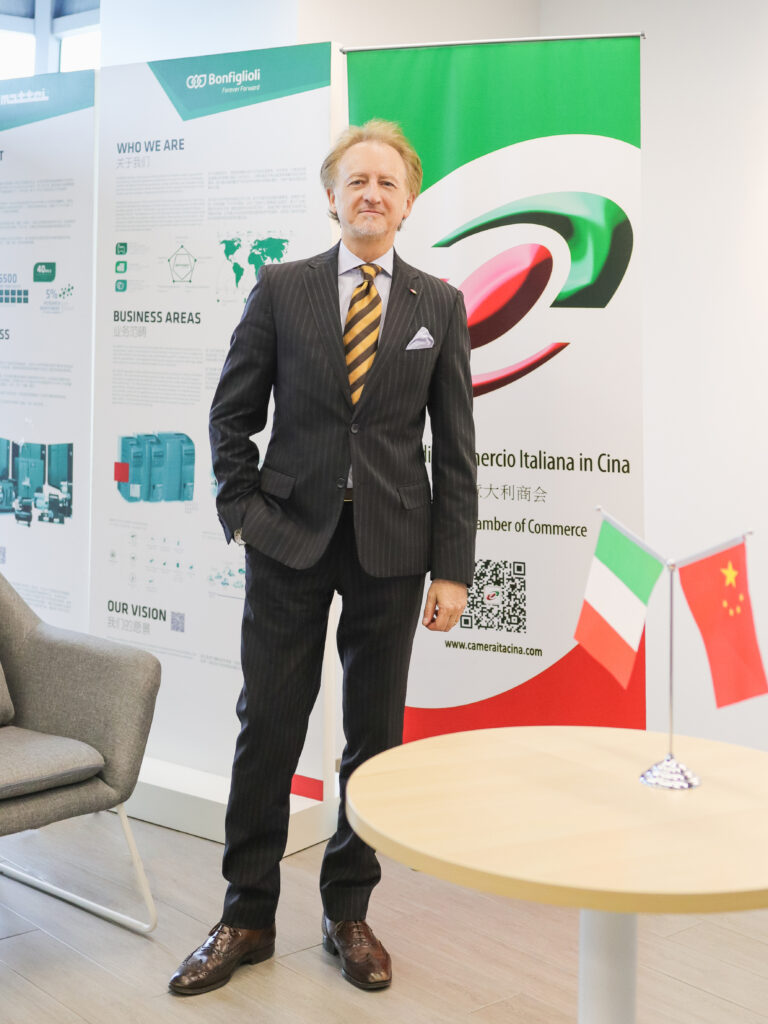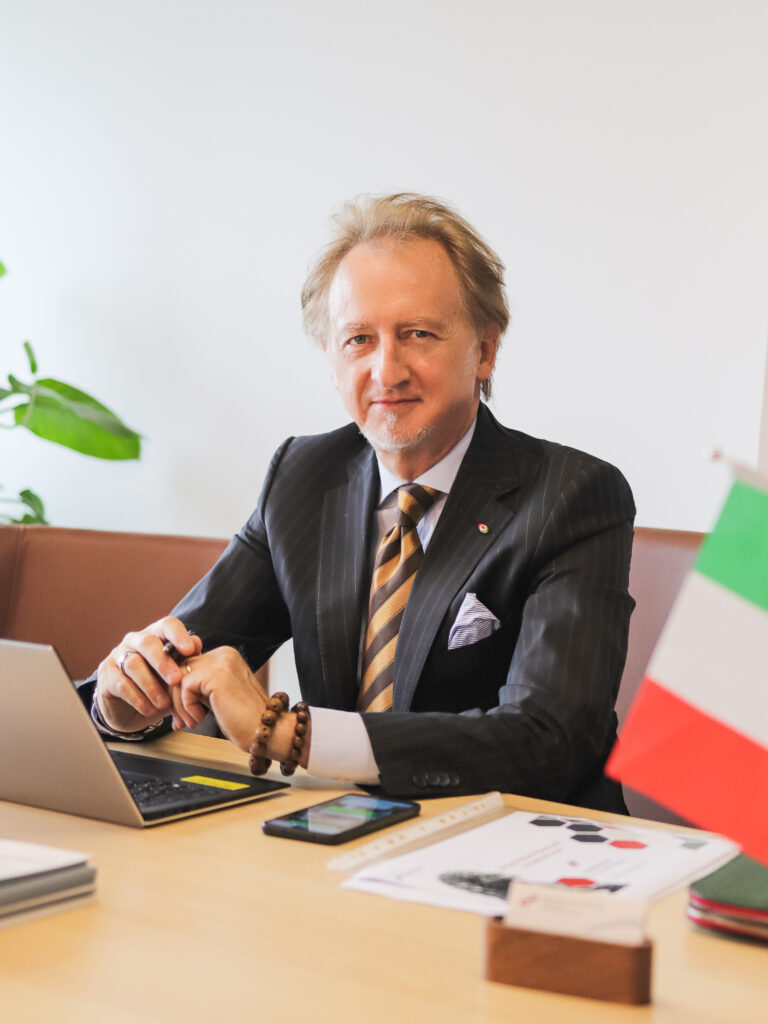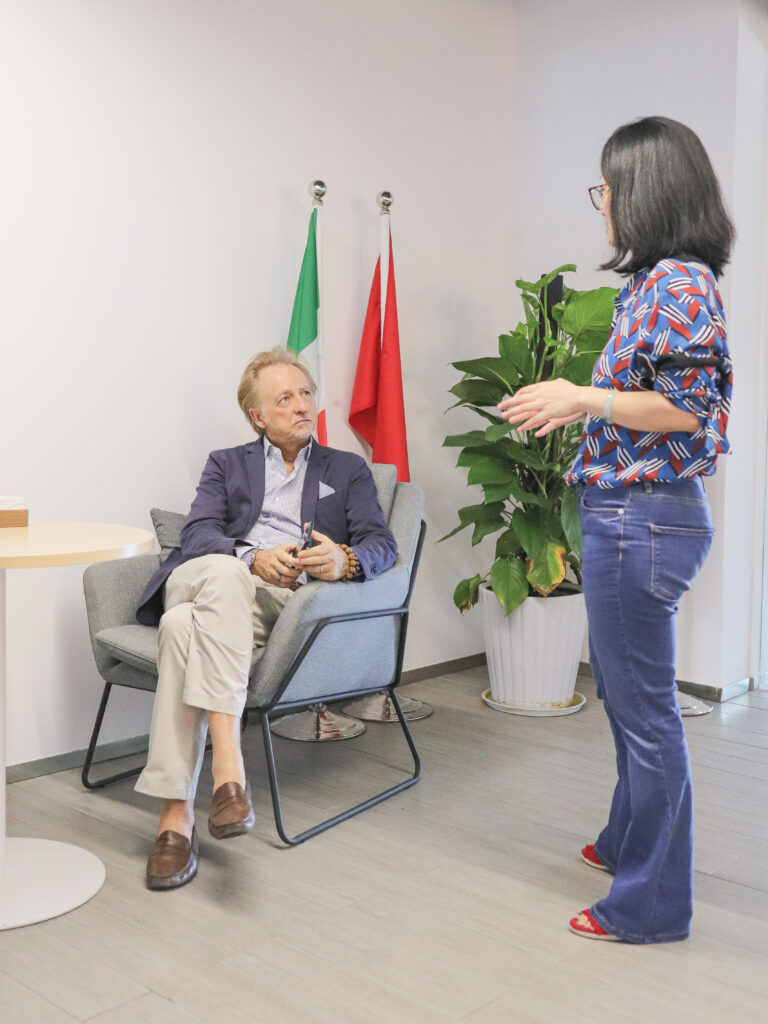
Galilei Circle of Friends – Interview with Paolo Bazzoni

In April 2020 Paolo Bazzoni was elected as the new President of the China-Italy Chamber of Commerce (hereafter simply “the Chamber”). He arrived in China in 2007, where at first he was appointed as the CEO of Prysmian group in China until 2012. From 2014 to present he has been a Member of the Board of Directors of Bonfiglioli Drives (Shanghai) Co.
His experience in China is extremely varied and valuable, thanks to many years directly involved on the ground, signing business deals and supporting Italian companies in a very difficult and complex market. When it comes to the Chamber in particular, he opened its Chongqing offices for SouthWest in 2015, and has been a Board Member until 2019.
He has always been a point of reference in Chongqing for our Institute and a key actor in supporting the development of fruitful cooperation between academia and business in Western China.

President Bazzoni in the Chamber’s offices of Chongqing
The national level: his new goals as President of the Chamber
Dear President Bazzoni, congratulations on your recent election. As Sant’Anna School and Galilei Institute, we are confident that your contribution will be important to relaunch the Chamber and firmly support Italian companies in China. Can you tell us why in your opinion in this difficult year Italy and its institutions still have to invest in China and its market?
The Chinese market is too important not to be present as Italian companies, especially in such a delicate situation, which still offers lots of opportunities for technologically-advanced and deeply localised companies in China. Companies of the calibre of Snam, Fincantieri, Bonfiglioli, Bracco, Modula, Piaggio, Nordica, Golden Goose – to name a few – entered the track on the occasion of the renewal of the Board of Directors of the Chamber. I strongly believe in a Chamber that acts as a company at the service of our companies.
Can you describe the innovation brought in the new board of the Chamber and the main directives of the new course?
The new management of the Chamber represents an excellent mix of the main components of the Italian industry located in China. This is a clear and strong message coming from those who work on the territory. We want to make all Italian entrepreneurs feel involved, no matter where their business is based in China and in which sector they are active in. The growth in size and the penetration of the territories are the main drivers in the Chamber strategy in China.
Regarding my personal goals as President, I can give you a short list. First of all, we need to strengthen our focus on the territories and local markets. In this contest, we need to offer and develop tailor-made services to companies and support to create integration with Chinese contacts and institutions at a local level always in full synergy with Italian institutions (Embassy, Consulates, and ITA ICE). In addition, we have to keep improving the efficiency and the quality of our services, to raise the level of visibility, and promote the Italian business system by working in a concrete and effective way on the ground. Last but not the least, we should tighten and secure collaboration and connection between industrial and trade associations in Italy and China.
After five months of work the Italian Chamber of Commerce in China has achieved important results: it reached a total of 550 members in China, and led concrete initiatives for our companies in all territories.
The pandemic has hit Italy and China from the demand side: how could the Chamber support the recovery of exports?
After an initial tough period, since June onwards China has gradually recovered, inverting all the trends, especially in the sectors in which Italian companies are involved. This is creating new great opportunities for our Italian companies, in mechanics, heavy duty, industrial components and quality retail sectors in particular.
The role of the Chamber could be decisive if we are able to effectively convey digital promotion and communication of the activities of our members in China and also support Italian companies not yet present in China in sectors like those of mechanics and quality retail. Chinese consumers have been very active online for a long time, and due to the pandemic are even more so. For this reason, we need a more “digital oriented” Chamber tightly linked to the local customers.
Therefore, we will use digital platforms to provide support and promotional opportunities both to the Italian businesses in China and to those from Italy to China by participating in initiatives launched by Chinese Municipalities and Provinces in the second part of the year, in synergy with other Italian institutions in China.
 President Bazzoni at his desk in Chongqing
President Bazzoni at his desk in Chongqing
The regional level – President Bazzoni’s experience in South Western China
President Bazzoni, we know that your relationship with Chongqing is deep, both at a professional and private level. What were your initial expectations about Chongqing?
I landed in Chongqing for the first time in 2014, choosing it as a city to establish the headquarters of the Chamber for the South West. My expectations were first and foremost to integrate with the local reality and with the business community (both Italian and Chinese), to create concrete foundations in support of growing business opportunities for Italian companies in the area.
My expectations so far have been fully met, thanks to the constant work aimed at achieving my goals, clear guidelines and a positive personal attitude to cultural integration. Personally I also found in Chongqing, in its people, in its cultural and social matrix, a synergic reality open to new goals, dialogue and stronger business relations. Being married to a woman from Chongqing further facilitated integration and allowed me to get closer to Chongqing cultural values.
What were the results achieved during your tenure as Director of Chongqing Office?
Chongqing, as an autonomous Municipality directly linked to the central Government, over the years has experienced a robust growth, especially in the logistics infrastructure, transport, and services sectors. The city is constantly evolving: it has developed increasing curiosity towards innovation, new businesses and lifestyle trends without losing its unique cultural soul.
From a personal and professional point of view my life has been consolidated and improved over the years, guaranteeing to me and my family a lifestyle in line with expectations. The Chamber in Chongqing has achieved excellent results with the new promotional centre for bilateral investments, in partnership with Liangjiang New Area. We have launched an accelerator for SMEs with ad hoc desks and services to create business opportunities in the area.
Why is Chongqing still playing an important role in your life and business in China?
As President my responsibility lies now on all the Chamber activities all over the territories (our offices are located in Beijing, Guangzhou, Shanghai, Suzhou and Chongqing) but Chongqing remains my hometown, where my family is based. When it comes to the future of the city, I think it will be able to further advance in becoming an eco-sustainable municipality, a smart eco city, and it will complete the logistics and transport integration towards the West of the country, also being linked to the regional brand new project called “Chengdu-Chongqing Economic Circle”.
Cooperation with industrial associations in Italy will also be increased to promote and give concrete support to new investments towards Chongqing, but also to assist Chinese companies and local Chinese Government delegations, always in synergy with the local Consulate.
 President Bazzoni working with a staff member in Chongqing offices
President Bazzoni working with a staff member in Chongqing offices
The personal level – President Bazzoni’s special relationship with China and its evolution over the years
Please tell us how you ended up in China and what has been your personal experience in Chongqing so far.
I would define myself as an Italian Globalised Executive Manager integrated in China. After getting my degree from Bocconi University in Milan, I immediately started working internationally for large Italian companies. I have lived and worked in different parts of the world: North America, South America, England, Switzerland and Italy, reaching positions of increasing responsibility. I landed in China directly from the United States in 2006. I lived in Beijing for the first six years, working for Prysmian China Investment Group as CEO. Then I got married to a Chinese woman and I decided to settle down in this country. Finally, I decided to move to Chongqing and make a change in my life in China.
Do you feel integrated in the Chinese environment?
Yes. When I first arrived in China I didn’t know anything about local culture and mentality. I think this was positive though, because in this way I could not be biassed, which allowed me to easily get to know local people, even with a limited knowledge of the language. I have always been an open-minded person, so I easily developed business and interpersonal relations, fully embracing this country’s virtues and culture.
I think that living in China represents a true energy booster for your everyday life, not only for personal matters, but also in making business.
What are the challenges for Italian companies in China?
Due to the rapid economic growth, the cost of labour, infrastructure, and services are no longer significantly cheaper in China. We cannot consider this country as a place where production costs are low and making investment is a sure hit. China is the biggest market of the world and now more and more prone to globalisation, therefore Italian companies planning to invest here should carefully define a strategic business plan, to let the Chinese side understand their approach and possibly join them. China is now requiring more innovation and technology to compensate for some internal shortcomings. For this reason, the investments made by Italian companies in China must be finalised to an almost full localization of people and structures.
Moreover, it is important to be market-oriented, rather than product-oriented: innovation and a well-developed business strategy addressing the market’s demands are vital.
Interview by Marco Bonaglia



